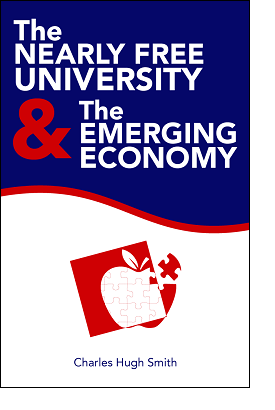

|

|
||||||||||||
|
Have a Merry DeGrowth Christmas--Boycott Black Friday (November 20, 2013) The "aggregate demand is God" Keynesian Cargo Cult fetish of focusing on holiday sales is worse than meaningless--it is profoundly misleading. Counting on strong holiday retail sales to "boost the economy" is like eating triple-paddy cheeseburgers and fries to lose weight. The last thing a debt-dependent economy needs is more borrowing to buy excess consumption, and the last thing an economy that imports most of the junk being purchased needs is empty-headed economists declaring that the purchase of more low-quality, mostly needless junk is anything other than a waste of money and resources.
Since most of the junk (and it is junk--most Americans have either forgotten what actual quality is or they have never experienced it) is made overseas, the "boost" to the economy generated by rampant charge-card consumption flows to only one slice of the the U.S. economy: corporate profits. U.S.-based global corporations skim most of the profits made when junk is made overseas; how much profit do you think the Chinese and Taiwanese suppliers of the iPad and iPhone components make? If you guessed 1%-2% of their part of the cost, you're right. So if a $300 device costs $100 to actually manufacture in China, the Chinese suppliers make a dollar or two. Apple skims about $100 and the distribution/retail channels skim the other $100. I have covered this dynamic in depth over the years: for example:
Trade with China: Making Out Like a Bandit (March 30, 2006)
Trade and "Trade War" with China: Who Benefits? (October 5, 2010) In effect, Black Friday is not about "deals," it's about padding already record-high corporate profits with excess consumption of 1) junk 2) needless stuff. Please, Santa, Let This Be the Last Christmas in America (that's supposed to "save" the U.S. economy) (November 23, 2010):
The propaganda machine is cranking up to announce that a 2% increase in holiday retail sales means the U.S. economy is off and running. Santa, please, please, please order your reindeer to stomp the life out of the idiotic fantasy that Americans buying a few billion dollars more needless junk from China is any sort of evidence that the U.S. economy is "growing at a healthy clip." The "aggregate demand is God" Keynesian Cargo Cult fetish of focusing on holiday sales is worse than meaningless--it is profoundly misleading. What the economy needs is not more mindless debt-based consumption (the "aggregate demand" that the cargo cult sees as a "folk cure" for everything that's wrong with the economy) but the exact opposite: paying down debt, reducing the share of the national income skimmed by a parastic banking sector, a boycott of low-quality junk (i.e. 90% of what's bought on Black Friday) and an evolution beyond a model of "growth" that's dependent on ever-rising debt and consumption of needless junk made overseas to benefit Corporate America's bulging bottom line. If you missed my recent entry on the Degrowth movement in Europe, please check it out: Degrowth, Anti-Consumerism and Peak Consumption (May 9, 2013) The anti-consumerism Degrowth movement is gaining visibility and adherents in Europe. Degrowth (French: décroissance, Spanish: decrecimiento, Italian: decrescita) recognizes that the mindless expansion of mindless consumption fueled by credit and financialization is qualitatively and quantitatively different from positive growth.
Degrowth is based on a number of principles: What if Progress requires less consumption, less debt, less shopping-gives-me-meaning? A DeGrowth Christmas does not mean a "no gift" Christmas: it means either making gifts, regifting (making a gift of something that is perfectly usable or in many cases, still in the box), giving an experience (i.e. time with someone), or (at least in my opinion) giving a well-made tool or book that leverages new skills or new understanding. Does excess consumption really add that much to our lives? Goodness gracious, people, look in the closets of America--they're stuffed to the gills with clothing, shoes, sporting goods, etc. etc. etc. Even "poor people" have endless gadgets, multiple TV sets, etc. etc. Look at the storage units crammed with excess everything. There's a new documentary on DeGrowth: GrowthBusters: Hooked on Growth; free screenings are being held on Black Friday in select cities. 1:39 minute video on the documentary: Attack of the Zombie Shoppers. Of related interest:
The Last Christmas in America (December 23, 2010)
 The Nearly Free University and The Emerging Economy:
The Nearly Free University and The Emerging Economy:
The Revolution in Higher Education If you want to understand:
You need this book
Read the Foreword, first section and the Table of Contents.
 Why Things Are Falling Apart and What We Can Do About It
Why Things Are Falling Apart and What We Can Do About It
If you want to understand:
You need this book Read the Introduction and the Table of Contents
Kindle: $9.95
print: $24
"This guy is THE leading visionary on reality.
He routinely discusses things which no one else has talked about, yet,
turn out to be quite relevant months later."
Subscribers ($5/mo) and contributors of $50 or more
this year will receive a
weekly email of exclusive (though not necessarily coherent) musings and amusings.
At readers' request, there is also a $10/month option.
What subscribers are saying about the Musings
(Musings samples here):
The "unsubscribe" link is for when you find the usual drivel here
insufferable.
All content, HTML coding, format design, design elements and images copyright © 2013 Charles Hugh Smith, All rights reserved in all media, unless otherwise credited or noted. I am honored if you link to this essay, or print a copy for your own use.
Terms of Service:
|
Add oftwominds.com |